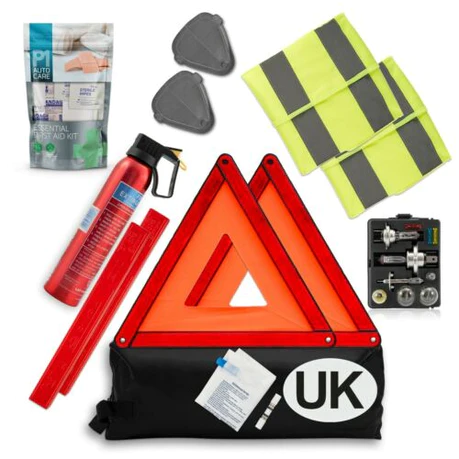DRIVING TO EUROPE THIS SUMMER? HERE’S EVERYTHING YOU NEED TO KNOW
With flight cancellations and soaring travel costs dominating headlines, and related topic searches such as ‘requirements for driving in Europe’ increasing (+750% YoY according to Google trends), it’s likely many people will be considering car travel as an alternative to reach their holiday destinations.
To help drivers prepare for a stress-free holiday road trip, CarStore experts have shared the following top tips for travelling in Europe this summer and beyond:
What you need to drive in Europe:
- To be 18 years old or over with a valid and full UK driving licence
- A certificate of motor insurance and your V5C logbook
- A ‘UK’ sticker on the rear of your car (or UK graphic on number plate) – GB stickers are no longer acceptable
- A warning triangle (these are standard in some cars) and a reflective jacket. These are needed in the event of a breakdown – without them you can be fined!
- Headlamp converters (some cars have a function you can apply in the car’s settings). These are compulsory to avoid dazzling other drivers
Full and up to date information on what is required to drive in all European countries, is available on www.gov.uk
What you need to know:
When departing via the Eurotunnel or travelling by ferry into France, perhaps the most important thing to remember is to drive on the right side of the road, and not the left as we do in the UK. If you are not renting a car and have travelled with your own, it is also worth being extra vigilant when overtaking or passing a stopped or parked car, as your view won’t be as accessible from the right-hand side of the road as it in the UK.
It’s also worth noting that headphone/headset use while driving in France and most of Europe is illegal – with the exception of a built-in handsfree, or an integrated system in a motorcycle helmet. It’s also an offence to use a hand-held mobile while driving in many European countries, as it is in the UK.
Speed limits and tolls
Kilometres and metres are used for speeds and signs in most of Europe, and you may not be aware that speed limits are reduced when it’s raining or during adverse weather conditions. Your UK car will usually have “kph” (kilometres per hour) also displayed on its dials, or you can change modern digital dials to read kph in the settings.
Speed limits for cars. in France for example, are as follows (number in brackets are the reduced speeds when raining):
- Motorway – 130kph (110kph)
- Priority road/dual carriageway – 110kph (100kph)
- Other roads – 80kph (70kph)
- Built-up areas – 50kphh (50kph)
- Visibility less than 50m – 50kph
There is also a minimum speed limit of 80kph on motorways for any cars travelling in the outside lane. Make sure you pay attention to the speed limits, as these can change depending on which European country you are in, so always check before travelling.
There are many tolls across Europe to be mindful of, usually on the motorways. These can be paid via credit/debit card or in cash. Some UK drivers go as far as attaching their card to an extension pole to reach over to the payment barrier (as they are typically on the driver’s side), although having a passenger is always handy for this reason!
Travelling with pets
Another reason many Brits choose to drive to Europe rather than fly, is that it is much easier to take a pet away with them. With the vast increase in pet ownership across the UK since the pandemic, there will be plenty who will need to check the below. Always verify the rules of the country you’re travelling to for any additional pet restrictions or requirements before you set off.
When travelling to an EU country or Northern Ireland, your pet needs:
- a microchip
- a valid rabies vaccination
- an animal health certificate (which can be obtained from you vet and cost around £100), or a valid pet passport that’s accepted in the country you’re travelling to
- tapeworm treatment for dogs if you’re travelling directly to Finland, Ireland, Northern Ireland, Norway or Malta
These requirements also apply to assistance dogs. Depending on the pet you are going to be bringing, always check relevant requirements, specific to any country you are visiting.
Mark Akbar, Managing Director for CarStore, adds: “Before setting off on any long-distance journeys, whether this in the UK or abroad, it’s important to make sure your car is in the safest possible condition, and you’ve carried out all of the necessary health checks. Your car should obviously have an up-to-date MOT, but if it’s been a while, things like checking your engine oil level and whether the lights are working properly are essential checks you’ll need to carry out yourself. For a more comprehensive vehicle health check, CarStore offers thorough inspections to monitor the overall condition of your car – completely free of charge – to give you peace of mind before you head off on your holiday adventures.”
For additional information on travel guides, visit this link to the Evans Halshaw website, which has further information about driving in multiple European countries and for further details on booking a free vehicle health check, visit this link on the CarStore website.
Help keep news FREE for our readers
Supporting your local community newspaper/online news outlet is crucial now more than ever. If you believe in independent journalism, then consider making a valuable contribution by making a one-time or monthly donation. We operate in rural areas where providing unbiased news can be challenging. Read More About Supporting The West Wales Chronicle

























